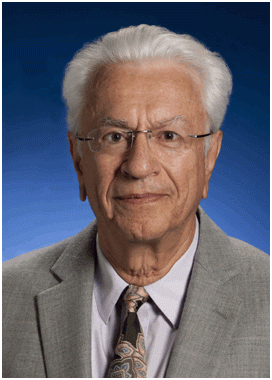event
CSTAR Distinguished Lecture: The Voyager spacecraft after 37 years in space
Primary tabs
The Center for Space Technology and Research (CSTAR) cordially invites you to attend the premier event of the CSTAR Distinguished Seminar Series. We are honored to feature Dr. Stamatios Krimigis who will present, "The Voyager spacecraft after 37 years in space: The quest for traveling beyond our solar system" which will provide discussion of some fascinating highlights of over 30 years of scientific discoveries.Please join us for a Welcome Reception at 6pm, followed by the seminar at 7pm. Public is invited to attend.
Dr. Stamatios Krimigis is Principal Investigator on several NASA spacecraft, including Voyagers 1 and 2 to the Outer Planets and the Voyager Interstellar Mission, and the Cassini-Huygens mission to Saturn and Titan. He and colleagues proposed and implemented the Near Earth Asteroid Rendezvous (NEAR) mission and oversaw its landing on the asteroid Eros on February 12, 2000, the first ever landing on an asteroid. He has designed and built instruments that have flown to all eight planets, and also the New Horizons mission currently headed to Pluto.
Dr. Stamatios Krimigis received his B.S. Physics from the University of Minnesota (1961), his M.S. (1963) and Ph.D. (1965) in Physics from the University of Iowa, and served on the faculty there. In 1968 he moved to the Applied Physics Laboratory of Johns Hopkins University, became Chief Scientist in 1980, Space Department Head in 1991, and Emeritus Head in 2004. The Space Department has designed, built and operated more than 65 spacecraft, and expanded its activities to planetary missions during his tenure.
He has published more than 560 papers in peer-reviewed journals and books on the physics of the sun, interplanetary medium, planetary magnetospheres, and the heliosphere, with over 11,000 citations. He is recipient of NASA’s Exceptional Scientific Achievement Medal three times (1981, 1986, 2014), is a Fellow of the American Physical Society (APS), American Geophysical Union (AGU), American Association for the Advancement of Science (AAAS), and American Institute of Aeronautics and Astronautics (AIAA), recipient of COSPAR’s Space Science Award in 2002, a recipient of the Basic Sciences Award of the International Academy of Astronautics (1994) where he chairs the Board of Trustees for Basic Sciences, awardee of the Council of European Aerospace Societies CEAS Gold Medal for 2011, recipient of the Jean Dominique Cassini Medal of the European Geophysical Union, the AIAA James Van Allen Space Environments Medal, both for 2014, a member of the Academy of Athens since 2005 occupying the Chair of “Science of Space”, and chairman of Greece’s National Council of Research and Technology (2010-2013). He holds Honorary Doctorates from the Universities of the Aegean, Athens, and the International Hellenic University.
About the Center for Space Technology and Research (CSTAR):
The Center for Space Technology and Research (C-STAR) organizes, integrates, and facilitates Georgia Tech's space science and technology research activities. C-STAR brings together a wide range of Georgia Tech faculty who are active in space-related research and functions as a focal point for the growth of the space industry in the state of Georgia. C-STAR personnel are advancing the frontiers of astrophysics, Earth science, planetary science, robotics, space policy, space technology, and space systems engineering. C-STAR was established in 2013 and is led by Robert D. Braun (Director) and Thomas Orlando (Associate Director). C-STAR is actively engaged in partnerships with NASA's Jet Propulsion Laboratory, the Georgia Department of Economic Development Center of Innovation for Aerospace, and the Georgia Space Grant Consortium.
Status
- Workflow status: Published
- Created by: Cynthia Pendley
- Created: 12/17/2014
- Modified By: Fletcher Moore
- Modified: 04/13/2017
Categories
Keywords
User Data
Target Audience

